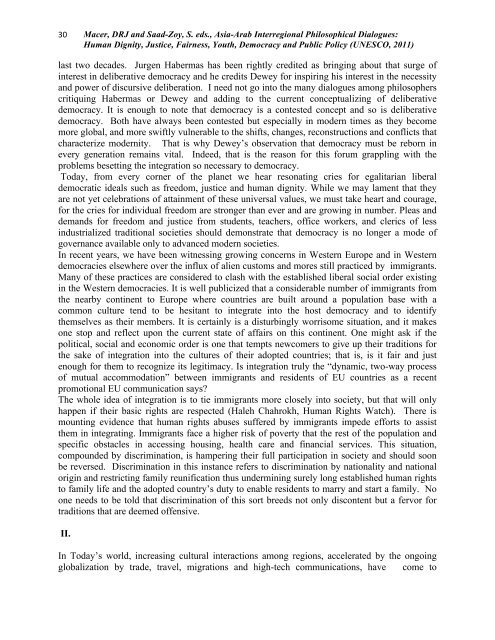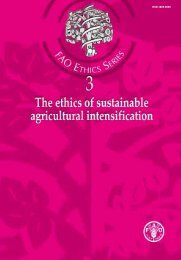Human Dignity, Justice, Fairness, Youth - Eubios Ethics Institute
Human Dignity, Justice, Fairness, Youth - Eubios Ethics Institute
Human Dignity, Justice, Fairness, Youth - Eubios Ethics Institute
You also want an ePaper? Increase the reach of your titles
YUMPU automatically turns print PDFs into web optimized ePapers that Google loves.
30 <br />
Macer, DRJ and Saad-Zoy, S. eds., Asia-Arab Interregional Philosophical Dialogues:<br />
<strong>Human</strong> <strong>Dignity</strong>, <strong>Justice</strong>, <strong>Fairness</strong>, <strong>Youth</strong>, Democracy and Public Policy (UNESCO, 2011)<br />
last two decades. Jurgen Habermas has been rightly credited as bringing about that surge of<br />
interest in deliberative democracy and he credits Dewey for inspiring his interest in the necessity<br />
and power of discursive deliberation. I need not go into the many dialogues among philosophers<br />
critiquing Habermas or Dewey and adding to the current conceptualizing of deliberative<br />
democracy. It is enough to note that democracy is a contested concept and so is deliberative<br />
democracy. Both have always been contested but especially in modern times as they become<br />
more global, and more swiftly vulnerable to the shifts, changes, reconstructions and conflicts that<br />
characterize modernity. That is why Dewey’s observation that democracy must be reborn in<br />
every generation remains vital. Indeed, that is the reason for this forum grappling with the<br />
problems besetting the integration so necessary to democracy.<br />
Today, from every corner of the planet we hear resonating cries for egalitarian liberal<br />
democratic ideals such as freedom, justice and human dignity. While we may lament that they<br />
are not yet celebrations of attainment of these universal values, we must take heart and courage,<br />
for the cries for individual freedom are stronger than ever and are growing in number. Pleas and<br />
demands for freedom and justice from students, teachers, office workers, and clerics of less<br />
industrialized traditional societies should demonstrate that democracy is no longer a mode of<br />
governance available only to advanced modern societies.<br />
In recent years, we have been witnessing growing concerns in Western Europe and in Western<br />
democracies elsewhere over the influx of alien customs and mores still practiced by immigrants.<br />
Many of these practices are considered to clash with the established liberal social order existing<br />
in the Western democracies. It is well publicized that a considerable number of immigrants from<br />
the nearby continent to Europe where countries are built around a population base with a<br />
common culture tend to be hesitant to integrate into the host democracy and to identify<br />
themselves as their members. It is certainly is a disturbingly worrisome situation, and it makes<br />
one stop and reflect upon the current state of affairs on this continent. One might ask if the<br />
political, social and economic order is one that tempts newcomers to give up their traditions for<br />
the sake of integration into the cultures of their adopted countries; that is, is it fair and just<br />
enough for them to recognize its legitimacy. Is integration truly the “dynamic, two-way process<br />
of mutual accommodation” between immigrants and residents of EU countries as a recent<br />
promotional EU communication says?<br />
The whole idea of integration is to tie immigrants more closely into society, but that will only<br />
happen if their basic rights are respected (Haleh Chahrokh, <strong>Human</strong> Rights Watch). There is<br />
mounting evidence that human rights abuses suffered by immigrants impede efforts to assist<br />
them in integrating. Immigrants face a higher risk of poverty that the rest of the population and<br />
specific obstacles in accessing housing, health care and financial services. This situation,<br />
compounded by discrimination, is hampering their full participation in society and should soon<br />
be reversed. Discrimination in this instance refers to discrimination by nationality and national<br />
origin and restricting family reunification thus undermining surely long established human rights<br />
to family life and the adopted country’s duty to enable residents to marry and start a family. No<br />
one needs to be told that discrimination of this sort breeds not only discontent but a fervor for<br />
traditions that are deemed offensive.<br />
II.<br />
In Today’s world, increasing cultural interactions among regions, accelerated by the ongoing<br />
globalization by trade, travel, migrations and high-tech communications, have come to

















